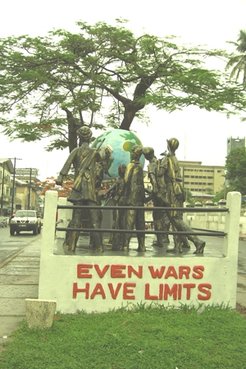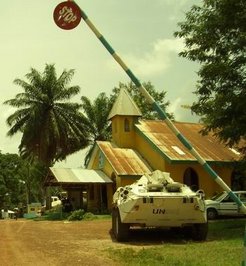Shifting identities, conflict and foreign interventions in post-war Liberia. Refigurations of ethnic, intergenerational and gender relationships
In the aftermath of the civil war there is a general dearth of information and understanding concerning contemporary social practices and relationships. After the cessation of organized violent conflict large sections of the Liberian people have to cope not only with severe economic conditions but also with social and cultural crises. Available resources are desperately contested. My assumptions are: The construction of identities by individuals or groups follows both ‘traditional’ and ‘imported’ models. Such constructions may foster processes of (re-)integration and reconciliation or breed further conflict. They constitute an important strategy in the struggle over claims to various kinds of economic and spiritual resources. Interventions by international agencies and national organizations addressing issues of leadership/ good governance, gender relations, and reconciliation (workshops, media broadcasting, theatre etc.) are providing various actors with new and contested resources of power and legitimacy.
My research questions are: How are identities and relations (re-) constructed in local situations characterized by (remnants of) hierarchical social organisation and apparently weakened local institutions? In what ways are these processes influenced by intervention models emphasizing participation, empowerment and transparency?

Some background information:
Historically and at the micro-level, ethnic belonging has been flexible and has to be considered as just one out of many possible dimensions of identity construction. Depending on the context, other dimensions proved more important for the forming of alliances and for the definition of patron-client relationships. This was also true during the civil war, where membership of the warring factions fluctuated considerably and often united people from groups previously considered as enemies, irrespective of ethnic identities. However, ethnic contradictions have been fostered and exploited in Liberia’s national conflicts for over two decades. In the course of the war, a latent cleavage between the so-called Mandingo and other ethnic groups intensified and constitutes a major issue in current local conflicts in the north and west of Liberia.
In some parts of the country Liberia’s gerontocratic system seems to have been destroyed at least temporarily. Over the last 15 years at least, the dominant line of cleavage seems to have become generational. The conditions of war gave youth and those considered as junior more agency and power than ever before. Ongoing struggles of elders to regain control over the youth seem to involve various strategies.
Traditionally, apart from Americo-Liberian sub-sections of society, women’s options were confined to the context of control by males and elders. Before the war, urban women were beginning to gain new opportunities and independence, escaping from the control by men and elders. During the war many women, notwithstanding their victimization through different kinds of violence and exploitation, gained independence to an extent that was unknown before. These women are trying to retain newly acquired roles and struggling for new positions in society as well as in their communities – a process which is fuelled at the national level by the female presidency of the country.

The uses of and cultural meanings of knowledge, including formal education, constitute a cross-cutting issue. Historically the ability to cause others to believe that one controls (esoteric) knowledge has played an important role in identity constructions and claims to resources both by men and women, youth and elders, and in local interethnic constellations. The role of knowledge was not confined to social domains governed by secret societies alone, it was also important in the domains of the educated elite.
This project is carried out in the context of the Research Group “Conflict and Integration as Dimensions of Cultural Tradition, Social Dynamics and Historical Experience in the Upper Guinea Coast / West Africa ”.
Processing information from previous professional settings I have been pursuing two additional projects:
a) interdisciplinary cooperation and the role of the social sciences in environmental research projects and
b) the practice of research partnerships between actors from the “south” and the “north” in the context of research in developing countries.

